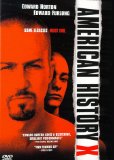There’s a couple reasons American History X makes my favorite movies list. One is simply that it’s a compelling look at a disturbing topic — neo-Nazism among young American men. Another is that it was a major step in Edward Norton becoming one of my favorite actors.
 At first, you may not think this is Norton, especially if you recall him as Aaron in the 1996 film Primal Fear. Released just two years later, American History X presents a bulked up, heavily muscled Norton. It is an amazing transformation. Combined with Norton’s talents as an actor, it helps make his character, Derek Vinyard, more believable. Norton earned plenty of best actor nominations for his performance, including the Oscar (won that year by Roberto Benigni for Life is Beautiful, one of the worst Academy Award decisions in my memory).
At first, you may not think this is Norton, especially if you recall him as Aaron in the 1996 film Primal Fear. Released just two years later, American History X presents a bulked up, heavily muscled Norton. It is an amazing transformation. Combined with Norton’s talents as an actor, it helps make his character, Derek Vinyard, more believable. Norton earned plenty of best actor nominations for his performance, including the Oscar (won that year by Roberto Benigni for Life is Beautiful, one of the worst Academy Award decisions in my memory).
Vinyard is a leading member of a skinhead group in Los Angeles. Despite being very intelligent, he makes no bones about his hatred. To him, every problem in America is due to “social parasites,” the “Blacks, Browns, Yellow whatever.” Vinyard ends up in prison after brutally murdering a black man. Although the story takes a road that is almost too pat when Vinyard realizes the error of his ways while in prison and then he is paroled on the condition he keep his younger brother from following the same path, the film is still powerful. The story is told from the timeframe following Vinyard’s release from prison and, while that is in color, all flashbacks were filmed in black and white, adding a unique approach to a film about race.
Rotten Tomatoes gives it an 83 percent rating, with a consensus that it is a “compelling and provocative story led by an excellent performance by Edward Norton.” It is in the range of “generally favorable reviews” at Metacritic, but users of the site give it a 9 out of a possible 10. I am clearly in the latter group, believing that while American History X has its flaws, it is an impressive and disturbing look at race and hatred in America.
Life’s too short to be pissed off all the time.
“Danny Vinyard” (Edward Furlong), American History X







